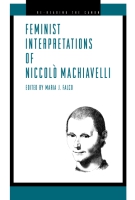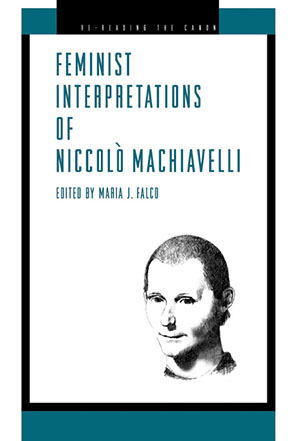Feminist Interpretations of Niccolò Machiavelli
Edited by Maria J. Falco
“This volume of 14 essays makes a valuable contribution to three related academic fields: history of feminist thought, history of political thought in North America, and the general history of political thought. In her Introduction, editor Maria Falco has done an excellent job of bringing her readers up to date on the evolving state of the feminist critiques of Machiavelli. . . . The new possibilities that Feminist Interpretations of Nicolò Machiavelli has opened up are challenging and rewarding. Young scholars who have the mental flexibility and the time to reread, to rethink, and to reinterpret him should take full advantage of them.”
- Description
- Reviews
- Bio
- Table of Contents
- Subjects
The contributors to this volume, grappling with questions about the position of women in political society, investigate whether or not Machiavelli was truly a misogynist and a proto-fascist or instead a proto-feminist and a democratic republican. Among the themes they explore are the implications of such dichotomies as Fortuna and virtù, the public and the private, nature and reason, ends and means, functionality and the common good, as well as the importance of the military to the socialization of citizens, particularly women, to civic life, and the social construction of gender. Some of the contributors even consider the possibility that Machiavelli's approach to ethics provides a special insight that feminists, and women generally, might explore to their benefit.
Besides the editor, the contributors are Wendy Brown, Jane Jaquette, Donald McIntosh, Melissa Matthes, Vesna Marcina, Martin Morris, Cary Nederman, Andrea Nicki, Mary O'Brien, Hanna Pitkin, Arlene Saxonhouse, John Shin, R. Claire Snyder, and Catherine Zuckert.
“This volume of 14 essays makes a valuable contribution to three related academic fields: history of feminist thought, history of political thought in North America, and the general history of political thought. In her Introduction, editor Maria Falco has done an excellent job of bringing her readers up to date on the evolving state of the feminist critiques of Machiavelli. . . . The new possibilities that Feminist Interpretations of Nicolò Machiavelli has opened up are challenging and rewarding. Young scholars who have the mental flexibility and the time to reread, to rethink, and to reinterpret him should take full advantage of them.”
“Falco provides a helpful introduction with a brief biography of Machiavelli and sets the context for the developing trends in feminist interpretation of Machiavelli. . . . From this volume it is clear that feminist scholars are not in accord in their view of Machiavelli, echoing other disagreements concerning his work. Feminist Interpretations provides a useful compilation of the diverse feminist approaches to Machiavelli and shows an added complexity to his thought not found in mainstream accounts. As such the volume fulfills the goal of its series in expanding our appreciation of the canon and providing an introduction to feminist readings of a major thinker.”
“This edited volume will be helpful for scholars of Machiavelli who may not be well versed in feminist theory, but, more significantly, it can be of use to feminist theorists developing approaches to politics.”
Maria J. Falco is Professor Emerita of Political Science at DePauw University. She has published five previous books, including Feminist Interpretations of Mary Wollstonecraft (Penn State, 1996).
Contents
Preface by Nancy Tuana
Acknowledgments
Introduction
1. The Modernity of Machiavelli
Donald McIntosh
2. Meditations on Machiavelli
Hanna Fenichel Pitkin
3. Niccolò Machiavelli: Women as Men, Men as Women, and the Ambiguity of Sex
Arlene W. Saxonhouse
4. Renaissance Italy: Machiavelli
Wendy Brown
5. The Root of the Mandrake: Machiavelli and Manliness
Mary O’Brien
6. Fortune Is a Woman—But So Is Prudence: Machiavelli’s Clizia
Catherine H. Zuckert
7. Machiavelli and the Citizenship of Civic Practices
R. Claire Snyder
8. The Seriously Comedic, or Why Machiavelli’s Lucrezia is not Livy’s Virtuous Roman
Melissa M. Matthes
9. Rhetoric, Violence, and Gender in Machiavelli
Cary J. Nederman and Martin Morris
10. Beyond Virtù
John Juncholl Shin
11. Machiavelli, Civic Virtue, and Gender
Vesna Marcina
12. Rethinking Machiavelli: Feminism and Citizenship
Jane S. Jaquette
13. Machiavelli and Feminist Ethics
Andrea Nicki
Appendix A Summary of La Mandragola
Appendix B Summary of Clizia
Selected Bibliography
Index
Mailing List
Subscribe to our mailing list and be notified about new titles, journals and catalogs.




